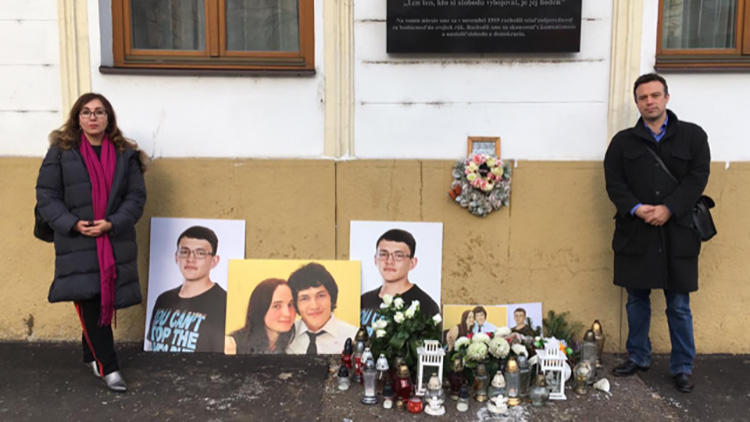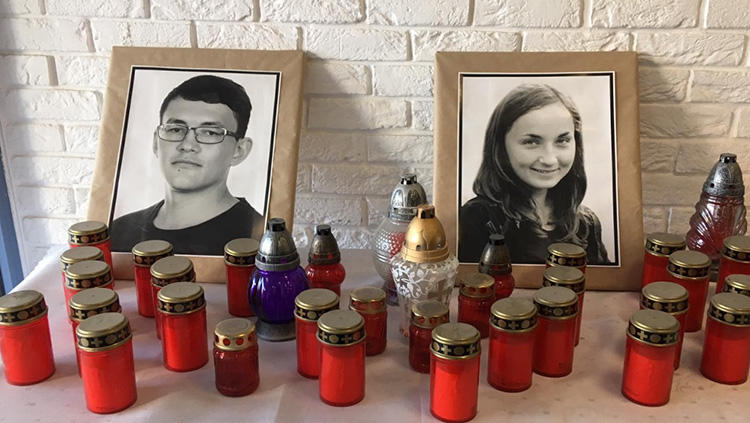Black-and-white portraits of Ján Kuciak and Martina Kušnírová, set amid unlit red candles, were the first things to greet me when I entered the building housing Aktuality, the news website where Kuciak, an investigative reporter, worked until his murder on February 21, 2018. One flight up is the newsroom where Kuciak’s colleagues continue his work.
Kuciak and his fiancée Kušnírová, both 27, were found dead in the house they bought together in Velká Mača, some 50 kilometers from capital Bratislava. They were young, happy and full of plans: they had their wedding outfits ready for their big day, set for early May, one of Kuciak’s colleagues told me.
Before his murder, Kuciak had worked with Aktuality and the Sarajevo-based Organized Crime and Corruption Reporting Project (OCCRP) on an investigation into an Italian mafia group, ‘Ndrangheta, and their incursions into Slovakia.
Investigative reporter Martin Turček, who now sits at Kuciak’s desk, showed me his colleague’s files in the drawers. He told me the desk was unoccupied for a while, but he then took it over–along with Kuciak’s work.
Turček is optimistic about the investigation into the murder. “We trust the law enforcement and the information they share with us on the investigation,” he said.
Kuciak’s murder–the first killing of a journalist that CPJ documented in Slovakia–shook society. Thousands took to the streets in protests that were the largest since the 1989 Velvet revolution that ended the communist era. The demonstrations forced Prime Minister Robert Fico and several high-level officials to resign. In late September, Slovak law enforcement detained three men and a woman and charged them with premeditated murder.
The Special Prosecutor’s Office in charge of serious crimes is now the main force behind the investigation. When I met with the office’s representatives, along with my colleague Tom Gibson and Scott Griffen, deputy director of the International Press Institute, in Pezinok, some 20 kilometers from Bratislava, they assured us that they were “very close to making charges against an individual or individuals who masterminded the murder.”
The officials, who allowed no photos and asked us not to mention their names publicly for safety reasons, said they were determined to ensure that no mastermind(s) go unpunished. They pointed out that not only the names but also the number of potential masterminds remain confidential.
But one name kept coming up during the conversations with Slovak journalists–that of Marian Kočner, a businessman whom Turček and others told me they believe was behind the murder. Zoltán Andruskó, one of the suspects arrested in September, alleged that Kočner ordered the killing. Another suspect, Alena Zsuzsová, is accused of paying 70,000 euros (US$79,600) for the hit. She allegedly had a close relationship with Kočner, according to reports. Media also reported that Kočner made threats against Kuciak.
Earlier this month, Kuciak’s Czech colleagues Pavla Holcová and Eva Kubániová, who contribute to OCCRP, published a detailed account based on police reports and official documents, of how the murder was planned and executed. On February 26, Aktuality published a report about Kuciak’s investigative work on Kočner in the 12 months prior to the murder, and the threats they said Kočner made against him.
Kočner has been in custody since June on unrelated financial fraud charges. Neither he, nor any other individual has been arrested or indicted with masterminding the killing. Kočner has denied any involvement in the murders, according to media reports.

Press code revisions
Slovakia has a vibrant journalistic community that united after Kuciak’s murder to demand a fair and swift investigation. The sense of unity has extended to other threats to their community.
During my meetings with Slovak journalists, one theme that kept coming up in conversation was a recent revision to the press code. Initiated by the ruling Smer party, which is headed by former Prime Minister Fico, the proposal includes a provision that gives politicians and public officials a right to reply. Fico said at a rally in December that the measure should be introduced to end “media terror and lynching.”
Journalists however, say the revision could be open to abuse by officials trying to prevent critical coverage.
The proposed bill, which has passed the first reading in the parliament, would abolish a current exception in the press code that excludes public servants and politicians from seeking a right to reply. Under the revised code, media outlets would have to publish replies from any individual, including those holding public office or political leaders, who claim that a report damaged their dignity, honor or privacy. Failure to comply could result in an order to pay damages up to nearly 5,000 euros (US$5,680).
Beata Balogová, editor-in-chief of the country’s largest independent newspaper Sme, said the provision was an attempt to legalize censorship and self-censorship by many outlets that cannot afford to pay fine.
“The current legislation already contains a right for correction that has been used widely by [Slovak] politicians. That resulted in many investigations against media outlets, including 52 ongoing ones against Sme,” she said.
Slovak journalists, like Balogová and Slovakia’s Press Publishers Association as well as international press freedom groups including OSCE’s Media freedom representative and the Council of Europe’s platform to promote the protection of journalism and safety of journalists, have criticized authorities and called on them drop the provision.
Balogová said over 460 journalists signed a letter to the legislators, demanding that they drop the revision. “But it looks like the law is going to pass in the second reading in March,” she said.
Safety fears for journalists
Kuciak’s colleagues carry on his work, working under that mantra that “by killing the messenger, you can’t kill the message.”
In January, the Investigative Center of Ján Kuciak (ICJK) was established by Aktuality editor-in-chief Peter Bardy, Slovak investigative journalist Arpád Soltész, and Holcová, who is also a founder of the Czech Center for Investigative Journalism in Prague. When I met with Soltész and his team in their small office in Bratislava’s Old Town on February 18, their first investigative report, “The Cocaine Cowboys,” was about to go online. The OCCRP, which partners with the new center, published the same report in English.
Both Soltész and Sme‘s Balogová said they were concerned by the lack of protection for investigative journalists. The official inquiry established that Kuciak had been under surveillance. And he was not the only journalist to be surveilled. Several others, including Sme‘s Adam Valček and Kuciak’s colleague Marek Vagovič of Aktuality, were also under surveillance and had their personal information checked, Balogová said. Former intelligence officer Peter Tóth, who has protected witness status in the Kuciak investigation, testified that he was spying on five journalists at the request of Kočner, according to media reports.
At a meeting with the Ministry of Interior, spokesperson Petar Lazarov assured CPJ that the journalists’ complaints would be taken seriously. “It’s in our interests to ensure safety of all citizens, including journalists, who are facing threats. We are ready to look into their concerns,” he said.
Balogová said Valček and three other journalists filed complaints to the police about the surveillance. “Nobody has done anything,” she said.
On the first anniversary of Kuciak’s and Kušnírová’s murder last week, hundreds of people flooded the streets of Bratislava. They demanded justice but also an end to corruption.
“Jan’s killing had become a test for all of us in Slovakia. It’s a turning point which will define whether we are firmly on the path of a European democracy or backsliding to authoritarianism,” Kuciak’s colleague, Kubániová, told me.
[Reporting from Bratislava]
